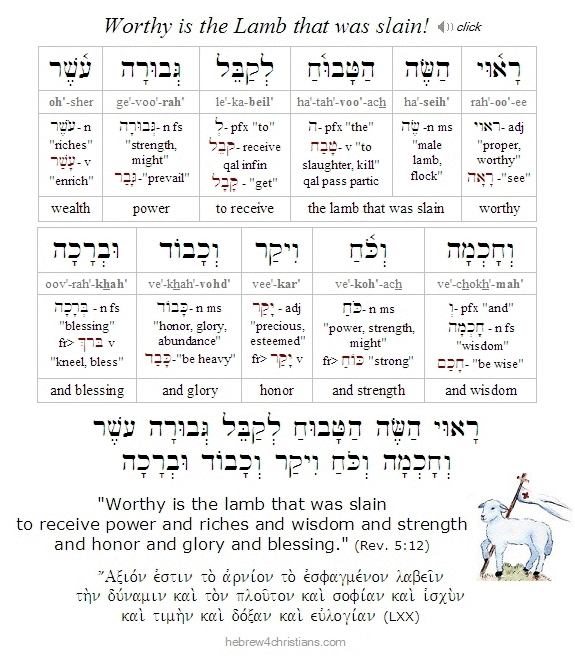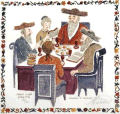|
The Torah is filled with various imperatives of one kind or another. The term mitzvah (ū×ū”ūĢūö) is a general term used to refer to any commandment given by God. The various mitzvot can be further divided into the subcategories of "chukkim" and "mishpatim" (Deut. 4:5). Generally speaking, mishpatim (ū×ų┤ū®ūüų░ūżų╝ųĖūśų┤ūÖūØ) are rules or "judgments" given for a clearly specified reason. These sorts of rules, such as the prohibition to steal, promote well-being in a society and therefore make sense to us. Chukkim (ūŚų╗ū¦ų╝ų┤ūÖūØ), on the other hand, are statutes given without a specifically stated reason (i.e., fiats or divine decrees). These sorts of decrees, such as the prohibition of mixing seeds or fabrics (kilayim), may appear irrational to human reason....
A verse from our Torah portion this week (Acharei Mot) states that God expects His people to "follow my rules (mishpatim) and keep my decrees (chukkim) and la-lechet bahem (ū£ųĖū£ųČūøųČū¬ ūæų╝ųĖūöųČūØ), 'to walk in them.' I am the LORD your God" (Lev. 18:4). This idea of "walking in" the commandments is called halakhah (ūöų▓ū£ųĖūøųĖūö), which derives from the verb halakh (ūöųĖū£ųĘūÜų░), meaning "to walk." Notice, however, the immediately following verse: "You shall keep my statutes and my rules, which the man who shall do them shall live by them (ūĢųĖūŚųĘūÖ ūæų╝ųĖūöųČūØ): I am the LORD" (18:5). The sages interpret this verse to mean that the Torah's commandments are intended to lead to life, and therefore they deduced that there were certain cases where the commandments may be broken to avoid the loss of life. For instance, if some rasha (evil person) were to force you to eat non-kosher or to be killed, the sages state that you should go ahead and eat the unclean meat... The duty to honor life - pikuach nefesh - is more important than following the "letter of the law" in such extreme cases. The same can be said about violating the laws regarding the Sabbath: it is morally praiseworthy to violate the Sabbath day in order to save someone's life... Likewise, Queen Esther requested the Jews to fast precisely during the holiday of Passover because of the urgency of the situation... There are, however, certain exceptions that are regarded as "absolute" obligations. The prohibitions against murder, incest, and idolatry are always to be observed, even to the point of death itself. In these cases, in other words, it is better to die kiddush haShem (as a martyr) rather than to violate one of these commandments.
During the Holocaust, Jews at the concentration camps who wanted to observe the Passover Seder faced a dilemma regarding the "letter of the law." The Torah clearly states that no chametz was to be eaten during the days of Passover, but the only food given to the prisoners contained leaven. The prisoners were forced to either use chametz as their "matzah" (and water as their "wine") or else to fast for the holiday, thereby endangering their lives.... The rabbis quoted the verse from our Torah portion - "you shall live by my commandments" to imply "and not die by them" to not only permit the use of chametz but also provided a blessing for precisely doing so....
I share this with you to help keep things in perspective. As important as Passover rituals are (e.g., getting rid of chametz, etc.), they are never to trump the more important duties to honor life, to express gratitude, to walk in love, etc. Ahavat HaShem - the love of God - is ultimately what Passover (and the Cross) is all about, not religious rituals....
Someone might object that I am "adding" Jewish tradition to the words of the Scriptures by agreeing that "living by God's commandments" implies the (negative) duty not to die because of them, but I would argue that Yeshua Himself would agree with Jewish tradition in this case. In other words, I believe Yeshua would agree that it is a valid inference that "living by the commandments" is intended to promote life, and that sometimes the "letter of the law" may indeed be broken for the sake of saving or preserving life. Indeed Yeshua ran afoul of those Pharisees who regularly insisted that Jews should obey the "letter of the law" at the expense of the needs of others. Hence we see Yeshua going out of his way to heal people on the Sabbath day (Luke 13:14; John 5:7-12); we see him touching the "untouchable" lepers (Matt. 8:2-3; Mark 1:40-31); we see him "consorting" with tax collectors and "sinners" (Mark 2:16; Luke 7:36-50), and so on. In fact, some of Yeshua's most scathing words of condemnation were delivered to those religionists who set aside "tithes" at the expense of the needs of others (Mark 7:9-13; Matt. 23:23; Luke 11:42).
It's important to remember that Yeshua didn't live in a cultural vacuum when he ministered among the Jews of the late Second Temple period... It may be safely said that Yeshua generally interpreted the moral meaning of the Torah similarly to Bet Hillel (and sometimes to Bet Shammai). He reaffirmed the central duty of the Torah (the Shema) and the duty to love others (for more on this subject, see the article, "Torah sheba'al Peh"). However it vital to remember that Yeshua did not come to teach us moral truth as much as He came to die as the Lamb of God... All of the moral law of the Torah is clearly restated in the New Testament. It is the sacrificial death of Yeshua that makes all the difference between the torah of the older covenant with the torah of the new.
So let's "keep the feast," chaverim, in the best way we can, but let's not forget what is really important during this season of Passover. Yeshua is the sacrificial Lamb of God who takes away all our sin and makes us clean before the Father... When God sees the blood of His Son, he "passes over" the visitation of his wrath (Exod. 12:13; John 1:29; 3:36). Any message or "ritual" of Passover that overlooks this central fact is therefore radically misguided.
Follow the path of peace, chaverim... I wish you a joyous and grace-filled Passover season in the love of Yeshua, our true Lamb of God!
ū©ųĖūÉūĢų╝ūÖ ūöųĘū®ų╝ūéųČūö ūöųĘūśų╝ųĖūæūĢų╝ūŚųĘ ū£ų░ū¦ųĘūæų╝ųĄū£ ūÆų░ūæūĢų╝ū©ųĖūö
ūóū®ūüųČū© ūĢų░ūŚųĖūøų░ū×ųĖūö ūĢų░ūøų╝ūŚųĘ ūĢų┤ūÖū¦ųĘū© ūĢų░ūøųĖūæūĢų╣ūō ūĢų╝ūæų░ū©ųĖūøųĖūö
ra┬Ęoo'-ee ha┬Ęseih ha┬Ętah┬Ęvoo'┬Ęach le┬Ęka┬Ębeil ge┬Ęvoo┬Ęrah,
oh'┬Ęsher ve┬Ęchokh┬Ęmah, ve┬Ękoh'┬Ęach vee┬Ękar, ve┬Ękhah┬Ęvohd uv┬Ęrah┬Ękha

"Worthy is the Lamb who was slain, to receive power and wealth and wisdom
and might and honor and glory and blessing" (Rev. 5:12)

Download Hebrew Study Card
Related:
|


